Gashanle | |
|---|---|
Town | |
| Country | |
| Region | Middle Shabelle |
| Time zone | UTC+3 (EAT) |
Gashanle (Somali : Gaashaanle) is a town in the Middle Shabelle (Shabeellaha Dhexe) region of Somalia. It is located in the southeastern part of the country.
Gashanle | |
|---|---|
Town | |
| Country | |
| Region | Middle Shabelle |
| Time zone | UTC+3 (EAT) |
Gashanle (Somali : Gaashaanle) is a town in the Middle Shabelle (Shabeellaha Dhexe) region of Somalia. It is located in the southeastern part of the country.

Somalia, officially the Federal Republic of Somalia, is a country in the Horn of Africa. The country is bordered by Ethiopia to the west, Djibouti to the northwest, the Gulf of Aden to the north, the Indian Ocean to the east, and Kenya to the southwest. Somalia has the longest coastline on Africa's mainland. Its terrain consists mainly of plateaus, plains, and highlands. Hot conditions prevail year-round, with periodic monsoon winds and irregular rainfall. Somalia has an estimated population of around 17.1 million, of which over 2 million live in the capital and largest city Mogadishu, and has been described as Africa's most culturally homogeneous country. Around 85% of its residents are ethnic Somalis, who have historically inhabited the country's north. Ethnic minorities are largely concentrated in the south. The official languages of Somalia are Somali and Arabic. Most people in the country are Muslims, the majority of them Sunni.
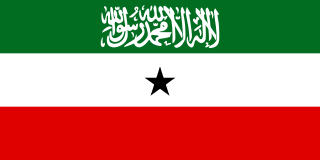
Somaliland, officially the Republic of Somaliland, is an unrecognised state in the Horn of Africa, recognised internationally as a de jure autonomous region of Somalia. Its located on the southern coast of the Gulf of Aden. It is bordered by Djibouti to the northwest, Ethiopia to the south and west, and Somalia to the east. Its claimed territory has an area of 176,120 square kilometres (68,000 sq mi), with approximately 5.7 million residents as of 2021. The capital and largest city is Hargeisa. The government of Somaliland regards itself as the successor state to British Somaliland, which, as the briefly independent State of Somaliland, united from 1960 to 1991 with the Trust Territory of Somaliland to form the Somali Republic.
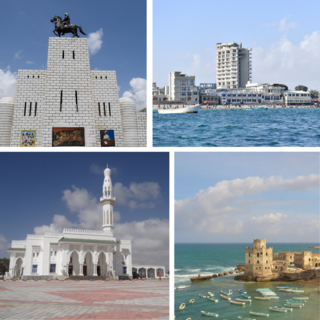
Mogadishu, locally known as Xamar or Hamar, is the capital and most populous city of Somalia. The city has served as an important port connecting traders across the Indian Ocean for millennia, and has an estimated urban population of 6,610,483. Mogadishu is located in the coastal Banadir region on the Indian Ocean, which unlike other Somali regions, is considered a municipality rather than a maamul goboleed.

The Horn of Africa (HoA), also known as the Somali Peninsula, is a large peninsula and geopolitical region in East Africa. Located on the easternmost part of the African mainland, it is the fourth largest peninsula in the world. It is composed of Ethiopia, Eritrea, Somalia and Djibouti; broader definitions also include parts or all of Kenya, Sudan, South Sudan, and Uganda. The term Greater Horn Region (GHR) can additionally include Burundi, Rwanda, and Tanzania. It lies along the southern boundary of the Red Sea and extends hundreds of kilometres into the Guardafui Channel, Gulf of Aden, and Indian Ocean and shares a maritime border with the Arabian Peninsula of Western Asia.
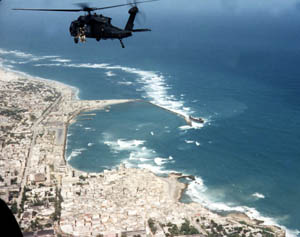
The Battle of Mogadishu, also known as the Black Hawk Down incident, was part of Operation Gothic Serpent. It was fought on 3–4 October 1993, in Mogadishu, Somalia, between forces of the United States—supported by UNOSOM II—against the forces of the Somali National Alliance (SNA) and armed irregular citizens of south Mogadishu.

Puntland, officially the Puntland State of Somalia, is a Federal Member State in northeastern Somalia. The capital city is the city of Garoowe in the Nugal region, and its leaders declared the territory an autonomous state in 1998. Geographically to the west, Puntland lays claim to the intra-46th meridian territories that were outside European colonial rule during parts of the Scramble for Africa period.

Mohamed Siad Barre was a Somali head of state and general who served as the 3rd president of the Somali Democratic Republic from 1969 to 1991. He was given the childhood nickname Barre roughly referring to extraversion. Barre, a major general of the gendarmerie by profession, became President of Somalia after the 1969 coup d'état that overthrew the Somali Republic following the assassination of President Abdirashid Shermarke. The Supreme Revolutionary Council military junta under Barre reconstituted Somalia as a one-party Marxist–Leninist communist state, renamed the country the Somali Democratic Republic and adopted scientific socialism.
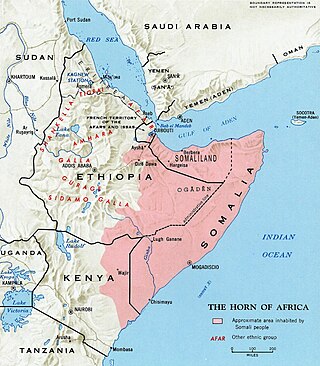
Somalisə-MAH-lee, soh- is an Afroasiatic language belonging to the Cushitic branch. It is spoken as a mother tongue by Somalis in Greater Somalia and the Somali diaspora. Somali is an official language in Somalia and Ethiopia, and a national language in Djibouti as well as in northeastern Kenya. The Somali language is written officially with the Latin alphabet although the Arabic alphabet and several Somali scripts like Osmanya, Kaddare and the Borama script are informally used.

Italian Somaliland was a protectorate and later colony of the Kingdom of Italy in present-day Somalia. Ruled in the 19th century by the Somali Sultanates of Hobyo and Majeerteen in the north, and in the south by political entities such as the Hiraab Imamate and Geledi Sultanate.

The Somalis are an ethnic group native to the Horn of Africa who share a common ancestry, culture and history. The East Cushitic Somali language is the shared mother tongue of ethnic Somalis, which is part of the Cushitic branch of the Afroasiatic language family, and are predominantly Sunni Muslim. They form one of the largest ethnic groups on the African continent, and cover one of the most expansive landmasses by a single ethnic group in Africa.

The Ogaden War, also known as the Ethio-Somali War, was a military conflict fought between Somalia and Ethiopia from July 1977 to March 1978 over the Ethiopian region of Ogaden. Somalia's invasion of the region, precursor to the wider war, met with the Soviet Union's disapproval, leading the superpower to end its support of Somalia and support Ethiopia instead.

The Somali Civil War is an ongoing civil war that is taking place in Somalia. It grew out of resistance to the military junta which was led by Siad Barre during the 1980s. From 1988 to 1990, the Somali Armed Forces began engaging in combat against various armed rebel groups, including the Somali Salvation Democratic Front in the northeast, the Somali National Movement in the northwest, and the United Somali Congress in the south. The clan-based armed opposition groups overthrew the Barre government in 1991.

The War in Somalia, also referred to as the Ethiopian Intervention in Somalia or the Ethiopian Involvement in the Somali Civil War, was a conflict largely involving Ethiopian forces and the Somali Transitional Federal Government (TFG), supplemented by troops from Puntland. The initial adversary in this conflict was the Somali Islamist group, the Islamic Court Union (ICU), but the extremist militant group Al-Shabaab soon took center stage as an insurgency intensified in the wake of the ICU's collapse.

Somali cuisine has moderate foreign influence from different countries mainly due to trade, but traditionally also varies from region to region due to the expansive landmass Somalis inhabit. It is the product of Somalia's tradition of trade and commerce. Some notable Somali specialties include kimis/sabaayad, canjeero/lahoh, xalwo (halwa), sambuusa (samosa), bariis iskukaris, and muqmad/odkac.

The African Union Mission in Somalia (AMISOM) was a regional peacekeeping mission operated by the African Union with the approval of the United Nations Security Council. It was mandated to support transitional governmental structures, implement a national security plan, train the Somali security forces, and to assist in creating a secure environment for the delivery of humanitarian aid. As part of its duties, AMISOM supported the Federal Government of Somalia's forces in their battle against Al-Shabaab militants.
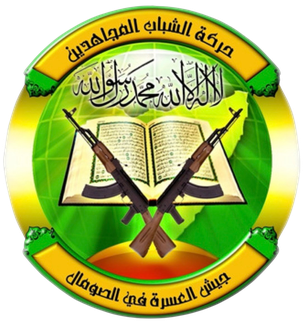
Harakat al-Shabaab al-Mujahideen, commonly known as al-Shabaab, is a Sunni Islamist military and political organisation based in Somalia and active elsewhere in East Africa. It is actively involved in the ongoing Somali Civil War and incorporates elements of Somali nationalism into its Islamist cause. Allegiant to the militant pan-Islamist organization al-Qaeda since 2012, it has also been suspected of forging ties with al-Qaeda in the Islamic Maghreb, and al-Qaeda in the Arabian Peninsula.
Piracy off the coast of Somalia occurs in the Gulf of Aden, Guardafui Channel, and Somali Sea, in Somali territorial waters and other surrounding places and has a long and troubled history with different perspectives from different communities. It was initially a threat to international fishing vessels during the early 2000s, only to rapidly escalate and expand to international shipping during the War in Somalia (2006–2009).

Djibouti, officially the Republic of Djibouti, is a country in the Horn of Africa, bordered by Somalia to the south, Ethiopia to the southwest, Eritrea in the north, and the Red Sea and the Gulf of Aden to the east. The country has an area of 23,200 km2 (8,958 sq mi).

The Somali Civil War (2009–present) is the ongoing phase of the Somali Civil War which is concentrated in southern and central Somalia. It began in late January 2009 with the conflict mainly between the forces of the Federal Government of Somalia assisted by African Union peacekeeping troops and al-Qaeda aligned al-Shabaab militants.

Hassan Sheikh Mohamud is a Somali politician who has served as the president of Somalia since May 2022. He is the founder and current chairman of the Union for Peace and Development Party. He was indirectly elected as President of the Federal Republic of Somalia on 15 May 2022, defeating the incumbent president Mohamed Abdullahi Mohamed Farmajo. He previously served in the same position as the 8th president of Somalia from 2012 to 2017. A civil and political rights activist, Hassan was previously a university professor and dean at SIMAD University, which he co-founded.